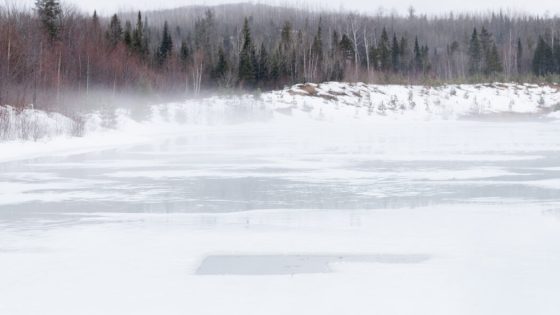Students from Colby College helped harvest ice from a pond for a new mikvah, or ritual bath, at a synagogue in Waterville.
WHY WE’RE HERE
We’re exploring how America defines itself one place at a time. When a synagogue in Maine needed water for a ceremonial Jewish bath, it drew on a fitting natural source, with the help of some friends.
Reporting from Waterville and Strong, Maine
Standing on a frozen pond in western Maine one Sunday morning last month, wearing L.L. Bean boots and a hooded sweatshirt, Rabbi Rachel Isaacs paused to consecrate the ice beneath her feet before she commandeered it for a higher purpose.
“Blessed are you, God, who has brought us to this moment!” the rabbi belted out. Austin Thorndike, a member of her congregation at Beth Israel Synagogue in Waterville, stood beside her. When the prayer was over, he fired up his chain saw and bent to dip it into the hard surface of the pond, deftly making four quick cuts to free a slick, white, cartoon-perfect block of ice.
The ice was destined for a highly unusual end. As the blocks multiplied, a crew of Colby College student athletes sprang into action, pulling them from the pond, pushing them to shore and swiftly loading them into waiting trucks. Next, the frozen cargo would be driven 40 miles to the synagogue, where the students would carry it to the basement. There, they would wipe each block clean with a cloth, stack it in the congregation’s brand-new mikvah, and leave it to melt.
The mikvah — a traditional Jewish bath used in rites of renewal and purification for thousands of years — would elevate this small synagogue in Waterville, a city of 16,000, to a destination for people from across Maine seeking a symbolic fresh start. But its creation, in accordance with ancient Jewish law, was not as simple as turning on a tap. To be kosher, a new mikvah must be initiated with “living water,” taken straight from nature.
Harvesting ice from a pond was not the easiest approach. (Collecting rainwater is more common.) But the woodsy, wintry plan felt right for Maine, participants said. So did the involvement of Colby students, some of them Jewish and some not.
In a rural state where a small Jewish population often needs grit, ingenuity and strong relationships to achieve its goals, the small liberal arts college and the small Waterville synagogue have long been closely tied. Friday night dinners at Beth Israel, hosted by Colby Hillel, the Jewish organization on campus, reliably serve 30 to 40 students, a mix of practicing Jews, their non-Jewish friends and others drawn to the cozy routine.
It was natural, then, for Rabbi Isaacs to seek ice-hauling help from students at Colby, where she is an assistant professor of Jewish studies and director of the college’s Center for Small Town Jewish Life.
Andrew Postal, a sophomore from Andover, Mass., brought fellow rugby players to the frozen pond, while Caitlin Kincaid, a senior from Colorado Springs, Colo., enlisted 10 members of the Colby Woodsmen Team, skilled in sawing wood and swinging axes.
“Upper body strength is something we have in abundance at Colby,” Rabbi Isaacs said.
At many synagogues, particularly Orthodox ones, the mikvah is reserved for strictly traditional uses, including conversion to Judaism and symbolic cleansing by women after menstruation. The new Waterville mikvah will be one of a few dozen across the country, and the only one in Maine, that is instead “open” — part of a 20-year-old movement by some more liberal congregations to make the tradition more inclusive, by using it to observe a more diverse array of milestones, like a college graduation or a gender transition.
Students recruited by the rabbi were eager to pitch in, even if they did not know what a mikvah was before she explained it.
“Everyone was like, ‘Yeah! The synagogue needs ice!’” said Will Whitman, 22, a senior rugby player who had quickly signed on to help. “Then we were like, ‘Wait — why does the synagogue need ice?’”
Stepping out onto the pond, their boots fortified with strap-on ice cleats, the students and other volunteers took turns gripping the heavy, freshly cut blocks with a pair of oversized log tongs and pulling them from the water. “It’s like the claw game,” said Alex Kimmel, 31, a member of a Jewish congregation in Augusta, as a block slipped out of her grasp and splashed back into the pond.
Others stood back and marveled at the scene — the small, spring-fed pond ringed by birch and pine; the fine mist rising from the melting snow; the students scooting ice blocks onto a plastic sled, which they dragged up a steep ridge of snow to the waiting trucks. More than one onlooker was reminded of the opening scene of “Frozen,” the Disney film set in frosty Arendelle.
To plan the operation, Rabbi Isaacs, 41, had leaned on the expertise of Mr. Thorndike, 35, an arborist and native Mainer who had offered the ice from a pond on his family’s land. (“I’m from the Jersey Shore,” Rabbi Isaacs said. “I trust the Maine-ness of my congregation.”)
Mr. Thorndike’s own conversion to Judaism, in 2020, helped spur the plan to build an in-house mikvah at Beth Israel. An immersion in living water is needed to complete the conversion process, but the nearest mikvah, about 60 miles away in Bangor, was closed at the time because of the pandemic.
Eager to seal the deal, Mr. Thorndike had agreed to immerse himself in a Maine lake instead — in October.
“To be kosher, it has to be three full submersions, and you can’t be touching anything, so I was treading water,” he said. “It was like Navy SEAL training.”
Watching him suffer, the rabbi resolved to engineer a less painful option.
“His teeth were chattering so much he could barely say the blessing,” she recalled.
Conversions have occurred with increasing frequency since Rabbi Isaacs arrived to lead Beth Israel. The congregation, founded in 1902, had dwindled to fewer than 20 families by the time she became rabbi in 2011. It has since rebounded to 70.
More than 20 percent of its current members are “Jews by choice” who were not raised in the religion — growth that Rabbi Isaacs sees as critical to her synagogue’s future, “and to the future of small-town Jewish life” across America.
The synagogue enlisted other Jewish congregations in Maine, which will also use the mikvah, to help pay for its ongoing maintenance.
“You might expect to see this in Boston or New York, but to have it here, in a small college town, is extraordinary,” said Julie Childers, director of the Mayyim Hayyim mikvah in Newton, Mass. “Sometimes it’s small towns where things like this can happen.”
Ms. Childers, who traveled to Maine for the ice harvest, oversees a national network of “open” mikv’ot (the plural of mikvah), providing guidance on construction, training sessions and text for ceremonies, among other services.
Rabbi Isaacs — who said she thinks of herself as “Waterville’s rabbi,” not just Beth Israel’s — will welcome non-Jews into the mikvah too, in keeping with the synagogue’s diverse relationships.
“It’s a venue for deepening one’s relationship with spirituality, for beginning again,” she said. “There aren’t many venues for that kind of renewal.”
With the Colby students keeping a brisk pace, shedding layers of clothing as they worked, the ice was cut and ready for transport in under an hour. Whisked through the woods and villages of western Maine — Rabbi Isaacs drove 10 of the 60 blocks herself in her pickup truck — the ice arrived at the synagogue just after noon.
It melted rapidly in the 60-degree room, dripping audibly into the deep basin and slowly filling it in the days that followed. After some water evaporated, Mr. Thorndike had to deliver a few more blocks, to ensure the mikvah contained the ton of living water required by Jewish law. But by the middle of March, the mikvah was ready.
On a Sunday afternoon two weeks after the ice harvest, Lucia Greene, 18, a Colby student, became the first to complete her conversion to Judaism in the mikvah, descending its seven steps — representing the seven days of creation described in the Torah — and immersing herself within its filtered, heated waters.
The milestone felt surreal, she said — and also “too soon,” even after nearly two years of preparation.
“But I’d been feeling Jewish for a while,” she said. “And when that’s how you feel, it’s time to go into the mikvah.”
Source Agencies




